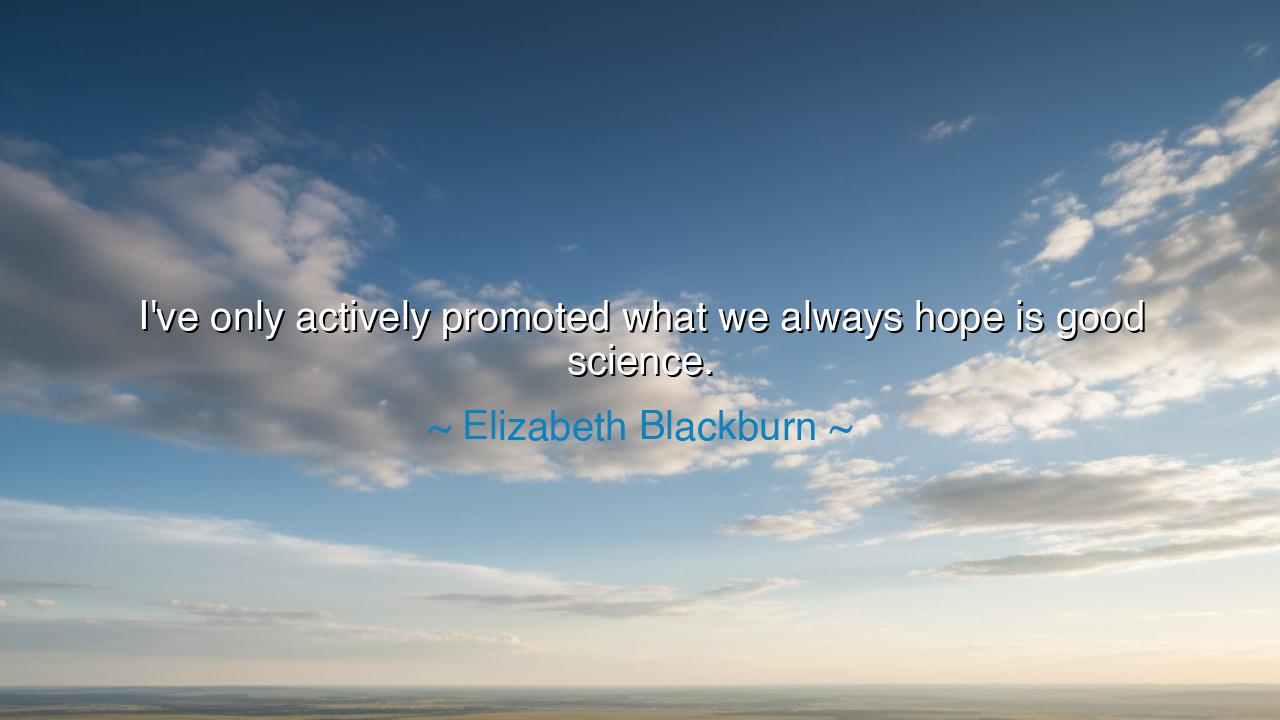
I've only actively promoted what we always hope is good science.






“I’ve only actively promoted what we always hope is good science.”
Thus spoke Elizabeth Blackburn, the seeker of truth within the living cell, the Nobel laureate whose discovery of telomeres illuminated one of the secret mechanisms of life itself. In this modest yet profound declaration, she reveals the sacred creed of the true scientist: to serve not ambition, not vanity, not power, but truth—the quiet, incorruptible flame that burns at the heart of all genuine inquiry. For in her words, the phrase “good science” carries more than technical meaning; it speaks of morality, of reverence, of humility before the infinite complexity of nature.
The origin of this saying lies in Blackburn’s lifelong devotion to scientific integrity. In her work, she uncovered how telomeres—the protective ends of chromosomes—hold the key to aging and the stability of life’s code. Her research transformed medicine and biology alike, opening doors to understanding how cells age, how they renew, and how they may one day heal beyond our current limits. Yet, for all her triumphs, she remained cautious, grounded, and ethical. Her words were spoken amid controversies about the misuse of genetic discoveries for profit or ideology. In that moment, she affirmed a timeless truth: science, like fire, can warm or destroy; it must always be governed by wisdom, honesty, and hope.
For “good science” is not merely accurate data or polished results—it is pure intention. It is the pursuit of understanding untainted by corruption, ego, or haste. True science, Blackburn reminds us, must be guided by the humility to admit error and the courage to face truth. The ancients called this virtue sophrosyne—balance, temperance, the harmony between knowledge and morality. When a mind seeks truth without reverence, knowledge becomes dangerous. But when it seeks truth in service of life, it becomes divine.
Consider the story of Galileo Galilei, who raised his eyes to the heavens and declared that the earth itself moved. His discoveries were born of “good science,” rooted in observation and reason. Yet he was condemned by those who feared the truth. Like Blackburn, he understood that the goal of science is not to please power, but to illuminate reality, even when it unsettles the comfortable. Galileo’s courage to stand by the evidence, despite persecution, remains one of humanity’s highest acts of intellectual faith. He, too, “actively promoted what we always hope is good science.”
But “good science” demands more than discovery—it demands character. Blackburn’s words speak of a moral compass within the scientist’s soul, a conscience that must resist the temptation of fame or manipulation. She reminds us that science without ethics becomes hollow, a tool for domination rather than enlightenment. To promote good science is not simply to make progress, but to ensure that such progress serves life, justice, and truth. The true scientist must walk the narrow path between curiosity and conscience, ever mindful of the weight of knowledge upon the world.
And yet, her words also shine with hope. She speaks not as one weary of struggle, but as one who still believes in humanity’s capacity for light. “We always hope,” she says—hope that the search for truth will not be twisted, that integrity will prevail, that discovery will uplift rather than corrupt. Hope, in this sense, is the hidden soul of science. It is what allows the human spirit to continue asking questions, even in the darkness, trusting that every spark of understanding brings us closer to harmony with the universe.
So, O seeker of truth, take this lesson to heart: promote what is good in all that you do. Whether you study the stars or tend the soil, let your pursuit of knowledge be rooted in honesty and guided by compassion. Ask not only, “Can this be done?” but also, “Should this be done?” Remember that every discovery, like every fire, needs a moral hand to tend it. For as Elizabeth Blackburn teaches, the greatest science—and indeed the greatest life—is that which is guided by hope, tempered by humility, and devoted always to the good.






AAdministratorAdministrator
Welcome, honored guests. Please leave a comment, we will respond soon